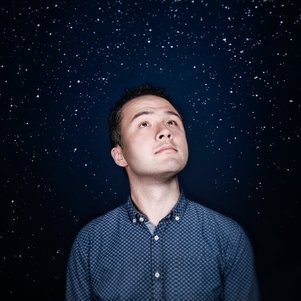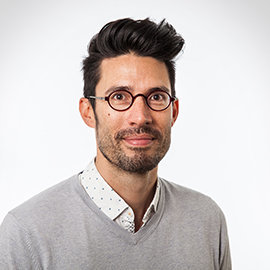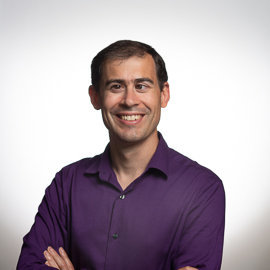ERC Consolidator grants and starting grant for TU Delft researchers
TU Delft researchers Akira Endo (EWI) and Daniel Tam (3mE) have been awarded an ERC Consolidator Grant. Javier Alonso-Mora has been awarded an ERC Starting Grant. These European grants are awarded to ambitious ‘frontier research’ projects that last five years.
ERC Consolidator grant: Terahertz Integral Field Unit with Universal Nanotechnology (TIFUUN)
To look back in time, you need to look far, far away in the universe. Conventional techniques for this are limited, but that is about to change. Akira Endo has received an ERC Consolidator grant for his TIFUUN project, which will create 3D maps of vast volumes of the universe. This better imagery could revolutionize our insights into the history of galaxies, and the formation of the ‘cosmic web’.
Some places in our universe, such as galaxies, have a higher density of matter and energy. Other volumes are almost void. This contrast of long and intricate clusters of galaxies with nothingness, together forms a cosmic web, which is constantly evolving. “We want to understand that development, by looking at how it started. I hope to uncover the history of all matter – to help us understand the evolution of galaxies and the emergence of the cosmic large-scale structure. No doubt this will provide many answers to the most fundamental questions in astronomy. But if I am honest, I hope the project will deliver just as many questions. That would mean we have really pushed the frontiers of astronomy.”
The revolutionary technology that will make this possible is TIFUUN, an instrument with a superconducting circuit that will measure the upper band of infrared light, coming from vast and distant volumes of the universe. The first application of TIFUUN will be at the Japanese ASTE 10-m telescope in Chile. This is familiar ground for Endo. He was there in 2017 to work on DESHIMA, a project that laid important groundwork for TIFUUN. It pioneered so-called integrated superconducting spectrometer (ISS) technology.
You can read this article for more information, or watch the video on DESHIMA below.

ERC Consolidator grant: Flows for Algae Growth: Uncovering the multi-scale dynamics of living suspensions (FLOW4ALGAE)
Photosynthetic microalgae hold promise for the sustainable production of high-value products, bioplastics and biofuels. In bioreactors, suspensions of living, soft, and motile cells form an entirely new kind of fluids, which physiologically respond to the environment and the flow conditions. Fundamental knowledge of the flow dynamics of living suspensions is now urgently needed to develop new flow technologies for bioreactors.
This project lays out an ambitious multi-scale experimental plan to establish the foundations of the fluid dynamics of living suspensions by revisiting three textbook aspects of flow: (1) turbulence, (2) the dynamics at solid and free interfaces and (3) the response to shear. This endeavour faces a new paradigm in complex flows, where fluid dynamics and cell physiology on different length scales, are deeply entwined. I will tackle this problem with a unique set of multi-scale experiments combining advanced flow diagnostics and rheology tools with new microfluidics and 3-D cell tracking recently developed in my group. These experiments will yield the first tracking measurements of living microalgae in a turbulent flow, and reveal what happens when motile cells on the small scale meet the turbulence cascade. Tracking experiments will provide new insight into the interactions of microalgae with free and textured surfaces, and, combined with rheology, show how shear flow affects cell motility and inversely how motility affects the response to shear of the suspension.
Together, these experiments will uncover the interrelations between flow, cell physiology and growth, and determine how cell motility can be leveraged to optimize the turbulent mixing conditions in bioreactors, avoid biofilm formation and mediate cell harvesting.
Read more about the research of Daniel Tam.

ERC Starting Grant - Intuitive Interaction for Robots among Humans - INTERACT
“The motivation for INTERACT is to have autonomous mobile robots that can safely perform tasks in places where they work together with humans. To do this we are going to provide these robots with the cognitive ability to work out how they interact with humans and other robots.”
Alonso-Mora will use machine learning to train local and global intuition models for multi-robot systems, which will provide them with insights into their future interaction with the environment. These intuition models will then be integrated into novel probabilistic optimisation methods to compute safe interaction-aware trajectories, task assignments and routes for the robots. The unified framework of INTERACT will make it possible for teams of mobile robots to safely navigate in human-centric environments and enable a whole new level of automation in factories and cities.

About ERC Consolidator grants
ERC Consolidator grants are part of the EU’s current research and innovation programme, Horizon Europe, and the 2021 call was worth in total €655 million. The ERC Consolidator Grants are awarded to outstanding researchers of any nationality and age, with at least seven and up to twelve years of experience after PhD, and a scientific track record showing great promise. Research must be conducted in a public or private research organisation located in one of the EU Member States or “Associated” Countries. The funding - up to €2 million per grant, plus in some cases an additional €1 million for start-up costs - is provided for up to five years and mostly covers the employment of researchers and other staff to consolidate the grantees' teams.
More information
Read the press release about the Consolidator Grants.